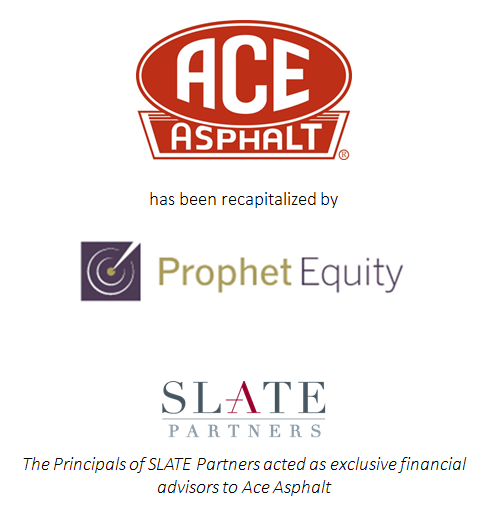Ace Asphalt of Arizona (“Ace”) provides outsourced facilities services in the area of parking lot engineering, construction and maintenance. These services are provided to commercial, industrial and institutional real estate owners and property managers such as AutoZone, CB Richard Ellis, Costco, Home Depot, Wal-Mart and Wells Fargo. Small projects consist of filling cracks, installing lot signage and reflectors, or simply sealing and striping a client’s parking lot. Larger assignments can require excavating and grading, asphalt pulverization and recycling or the complete design and installation of a new parking lot.
A host of factors drove the decision to pursue a recapitalization of Ace. The owner had a majority of his personal net worth invested in the company and yet was no longer involved in the daily operations. The executive management team that was responsible for running the Company did not own any equity in Ace, though they were in charge of building the business going forward. Finally, the owner recognized the next five years represented a unique opportunity for Ace to further solidify its market position, if aggressive growth initiatives were properly funded.
Ace hired the founders of SLATE to conduct a broad search process to identify a capital partner that could address all of the logistical issues described above without destroying the company’s corporate culture. The founders of SLATE identified numerous partners that met that criteria and thus the owner had multiple options going forward. Ultimately Prophet Equity was selected.
The cultural fit between Ace and Prophet Equity was outstanding. Prophet Equity pursued the opportunity as a true partnership between themselves, the owner, and the management team. While debt was used as part of the transaction, Prophet Equity did not over-leverage the business, but instead created a capital structure that allows management to focus its time on building the business and taking full advantage of the current market opportunities. Prophet Equity is an operationally oriented fund and management believed they could bring new ideas and efficiencies to the business in addition to the growth capital. For the owner, the recapitalization of Ace allowed him to obtain a significant amount of financial liquidity out of the transaction while still retaining equity ownership in the company going forward. Finally, the executive management team was able to obtain equity in the company for the first time.
Like most transactions, the recapitalization of Ace Asphalt had its challenges. The founders of SLATE worked through lending issues, complicated real estate lease negotiations, the unwinding of complex derivative products, securing on-going bonding support, funding the shutdown of internal phantom stock programs, mitigating the impact of built-in gain taxes resulting from a “C” to “S” conversion, and a host of many others. All of this was managed in a systematic and methodical way that resulted in a transaction that was started and closed within six months.
The Ace recapitalization illustrates how numerous objectives can be met in a single transaction:
- Financial liquidity for an owner whose primary wealth is tied up in a single asset
- On-going ownership and board involvement for an owner looking to retire
- Ownership transition to the next generation of leaders within the company
- Bringing in growth capital to take advantage of unique market opportunities
- Bringing in a partner that shares cultural values with the existing company but also has new ideas and initiatives





